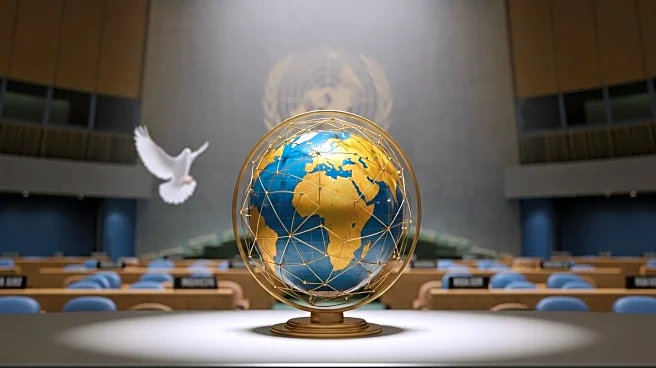What's Happening?
The United Nations General Assembly is marking its 80th anniversary amidst significant global challenges, including deadlock over conflicts such as the Russia-Ukraine war and the Israel-Hamas war in Gaza. The U.N. is experiencing financial cutbacks, primarily due to reduced funding from the United States. President Trump has withdrawn the U.S. from organizations like the World Health Organization and UNESCO, and his administration opposes the U.N.'s Sustainable Development Goals. This has led to concerns about the U.N.'s ability to fulfill its mission in the 21st century. Additionally, the recognition of a Palestinian state by countries like Australia, Canada, and the United Kingdom has been met with opposition from the U.S. and Israel, complicating diplomatic efforts.
Why It's Important?
The developments at the U.N. General Assembly highlight the shifting dynamics in international relations and the role of the U.S. in global governance. The reduction in U.S. funding and support for U.N. initiatives could impact efforts to address global issues such as poverty, health, and gender equality. The recognition of Palestinian statehood by several countries may influence peace negotiations in the Middle East, potentially leading to increased tensions. The U.N.'s ability to mediate and resolve conflicts is crucial for maintaining international stability, and the current challenges underscore the need for effective diplomacy and cooperation among member states.
What's Next?
The U.N. General Assembly will continue to address these issues during its high-level week, with nearly 150 heads of state and government expected to participate. Discussions will focus on finding solutions to ongoing conflicts and enhancing the U.N.'s role in global diplomacy. The recognition of Palestinian statehood may lead to further diplomatic efforts, including a conference organized by France and Saudi Arabia. The U.N. will also need to navigate the implications of U.S. policy shifts and explore alternative funding sources to sustain its operations.
Beyond the Headlines
The U.N.'s challenges reflect broader geopolitical shifts, including China's increasing influence as the U.S. reduces its involvement. This could lead to changes in the balance of power within the U.N. and affect its ability to address global issues effectively. The situation also raises ethical questions about the role of major powers in supporting international institutions and the impact of political decisions on humanitarian efforts.










